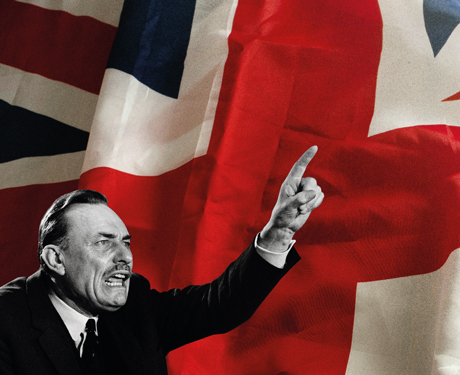Chris Hannan’s What Shadows, making its London debut after a critically acclaimed run at the Birmingham Repetory in 2016, looks at the ever-changing United Kingdom by focusing on Enoch Powell, a Tory MP who managed to divide and unite a country through one explosive speech in 1968.
Shifting between 1967/68 and 1992 Powell, an award deserving performance from Ian McDiarmid who not only is physically and vocally uncanny but brings a human quality to a now caricature of a man, spends his career trying to fit in; fit in with his Tory colleagues despite his grammar school education, fit in with his working-class constituents who have been abandoned by Labour for being bigots and trying to get ahead. He turns to his intellectual friends, journalist Clem and his wife Marjorie (Nicholas Le Provost and Paula Wilcox) when he needs attention for a speech. Boris’s basic bitch articles are nothing compared to planning Powell made to make ‘Rivers of Blood’s the huge deal it became.
Powell’s empathy with the working class is not sensing their loss of British identity but his own personal loss of never getting to govern India, ignoring the fact that he would have been exactly like the immigrants he chastises for coming in and changing a country’s identity.

When you see the speech, it feels a bit of disappointment, not because of the impact it still has but because the director Roxanna Silbert clutters McDiarmid with other actors. This scene should simply be the audience, McDiarmid, and a spotlight. It doesn’t help that Hannah’s script also feels slightly stuffed. Whilst you need a character like Rose Cruickshank (Amelia Donkor) to explore what happened after the speech was made I am not entirely convinced she was the right one. Flanked by her former contemporary Sofia Nicol (Joanne Pearce, who is great in her dual roles of Sofia and Powell’s wife Pamela) it often felt like their issues of identity (women, intelligent, children of immigrants, Oxford academics etc) should have been its own play.
This B story leads to an interesting meeting of minds between Powell and Cruickshank in a cemetery as they argue that identity is like a child and those on opposing sides are like parents in a custody battle, asking themselves what is it to be English. It is all very worthy and interesting but we take this maze-like route, including a storyline involving Grace (Paula Wilcox), the one white woman left who Powell focused on in his Birmingham speech, to get there. As it stands the play seems closer to three hours, it doesn’t need to be this long and if it does then focus on the human stories of the characters we should care about.
Rose’s issue with race and her mother (whose Caribbean approach to race is at odds with her British neighbours) should be this fascinating catalyst to the climax but instead is forgotten for this Powell/Rose showdown, that isn’t as strong as the Powell/Clem showdown we see earlier where Clem faces his lost friendship with Powell as he not only comes to terms with being a liberal editor in an increasing illiberal readership and his own guilt that he helped Powell get his poison out to into the masses.

In a time of Brexit, MPs and leaders of the free world using ‘Us and Them’ to bolster their own motives and careers it is very timely to see Powell as the grandfather of self-promotion rather than racism and hate. You also don’t get extraordinary performances like Ian McDiarmid’s that often and he brings a real gravitas and understanding of a man I previously saw as a bit of joke with a strong supporting cast this is a well-acted, well-written play amongst some questionable production decisions.


One response to “What Shadows, Park Theatre”
[…] What Shadows, Park Theatre […]
LikeLike